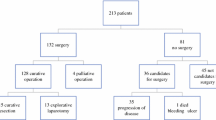PURPOSE
A positive circumferential resection margin is associated with a high risk of local recurrence and distant metastasis after total mesorectal excision for rectal cancer. The mesorectum is thinner anteriorly than posteriorly, and the risk of a positive resection margin may be higher for anterior than for posterior tumors. We sought to determine the effect of the tumor's position in the circumference of the rectum on the treatment and outcomes of rectal cancer patients treated by total mesorectal excision.
METHODS
We retrospectively analyzed 401 patients with rectal cancer staged by preoperative endorectal ultrasound and treated by sharp mesorectal excision with or without neoadjuvant therapy. Tumors were classified into four groups (anterior, posterior, lateral, and circumferential) according to the location of deepest point of penetration on endorectal ultrasound. Differences in recurrence and survival rates were analyzed with logistic regression analysis.
RESULTS
Of the 401 tumors, 27 percent were anterior, 26 percent posterior, 32 percent lateral, and 15 percent circumferential. The groups did not differ in age, gender, tumor distance from the anal verge, or tumor grade. The ultrasound and pathology stages were more advanced in the circumferential group, and the proportion of uT4 tumors was higher in the anterior group. Circumferential and anterior tumors were more likely to receive preoperative adjuvant radiation. After an average follow-up of 44 months, 20 percent of patients had developed recurrence (13 percent distant, 6 percent local, and 1 percent distant and local). Recurrence was associated with advanced tumor stage, tumor proximity to the anal verge, and no preoperative adjuvant therapy. Early tumor stage and preoperative chemoradiation were associated with lower recurrence and improved survival. When tumor stage was controlled for, patients with poor or undifferentiated tumors and male patients with anterior tumors were shown to have a higher risk of recurrence or death. The estimated five-year disease-free survival for the entire group was 73 percent.
CONCLUSIONS
Tumor stage is the main criterion to estimate prognosis in rectal cancer patients. The position of the tumor within the circumference of the rectum may provide valuable clinical information. Anterior tumors tend to be more advanced and, at least in male patients, has a higher risk of recurrence and death than tumors in other locations.



Similar content being viewed by others
REFERENCES
JK MacFarlane RD Ryall RJ Heald (1993) ArticleTitleMesorectal excision for rectal cancer Lancet 341 457–60 Occurrence Handle8094488 Occurrence Handle10.1016/0140-6736(93)90207-W Occurrence Handle1:STN:280:DyaK3s7msVOksQ%3D%3D
P Quirke P Durdey MF Dixon NS Williams (1986) ArticleTitleLocal recurrence of rectal adenocarcinoma due to inadequate surgical resection. Histopathological study of lateral tumor spread and surgical excision Lancet 2 996–9 Occurrence Handle2430152 Occurrence Handle10.1016/S0140-6736(86)92612-7 Occurrence Handle1:STN:280:DyaL2s%2FjvVeksw%3D%3D
NR Hall PJ Finan T al-Jaberi CS Tsang SR Brown MF Dixon P Quirke (1998) ArticleTitleCircumferential margin involvement after mesorectal excision of rectal cancer with curative intent. Predictor of survival but not local recurrence? Dis Colon Rectum 41 979–83 Occurrence Handle9715152 Occurrence Handle10.1007/BF02237384 Occurrence Handle1:STN:280:DyaK1czotVyrtg%3D%3D
IJ Adam MO Mohamdee IG Martin et al. (1994) ArticleTitleRole of circumferential margin involvement in the local recurrence of rectal cancer Lancet 344 707–11 Occurrence Handle7915774 Occurrence Handle10.1016/S0140-6736(94)92206-3 Occurrence Handle1:STN:280:DyaK2czlvFeisw%3D%3D
ID Nagtegaal CA Marijen EK Kranenbarg et al. (2002) ArticleTitleCircumferential margin involvement is still an important predictor of local recurrence in rectal carcinoma: not one millimeter but two millimeters is the limit Am J Surg Pathol 26 350–7 Occurrence Handle11859207 Occurrence Handle10.1097/00000478-200203000-00009
RJ Heald BJ Moran (1998) ArticleTitleEmbryology and anatomy of the rectum Semin Surg Oncol 15 66–71 Occurrence Handle9730411 Occurrence Handle10.1002/(SICI)1098-2388(199809)15:2<66::AID-SSU2>3.0.CO;2-3 Occurrence Handle1:STN:280:DyaK1czpvVWkuw%3D%3D
I Lindsey RJ Guy BF Warren NJ Mortensen (2000) ArticleTitleAnatomy of Denonvilliers' fascia and pelvic nerves, impotence, and implications for the colorectal surgeon Br J Surg 87 1288–99 Occurrence Handle11044153 Occurrence Handle10.1046/j.1365-2168.2000.01542.x Occurrence Handle1:STN:280:DC%2BD3crgtVGlsw%3D%3D
J Emslie R Beart M Mohiuddin G Marks (1998) ArticleTitleUse of rectal cancer position as a prognostic indicator Am Surg 64 958–61 Occurrence Handle9764701 Occurrence Handle1:STN:280:DyaK1cvjsFOgsg%3D%3D
J Garcia-Aguilar J Pollack SH Lee et al. (2002) ArticleTitleAccuracy of endorectal ultrasonography in preoperative staging of rectal tumors Dis Colon Rectum 45 10–5 Occurrence Handle11786756 Occurrence Handle10.1007/s10350-004-6106-3
Fleming ID, Cooper JS, Henson DE, et al , eds. AJCC cancer staging handbook. 5th ed. Philadelphia: Lippincott-Raven, 1998
NA Janjan J Abbruzzese R Pazdur et al. (1999) ArticleTitlePrognostic implications of response to preoperative infusional chemoradiation in locally advanced rectal cancer Radiother Oncol 51 153–60 Occurrence Handle10435807 Occurrence Handle10.1016/S0167-8140(99)00054-7 Occurrence Handle1:STN:280:DyaK1Mzmt1Wrtw%3D%3D
JF Bosset V Magnin P Maingon et al. (2000) ArticleTitlePreoperative radiochemotherapy in rectal cancer: long-term results of a phase II trial Int J Radiat Oncol Biol Phys 46 323–7 Occurrence Handle10661338 Occurrence Handle10.1016/S0360-3016(99)00411-3 Occurrence Handle1:STN:280:DC%2BD3c7isV2mtg%3D%3D
L Ruo S Tickoo DS Klimstra et al. (2002) ArticleTitleLong-term prognostic significance of extent of rectal cancer response to preoperative radiation and chemotherapy Ann Surg 236 75–81 Occurrence Handle12131088 Occurrence Handle10.1097/00000658-200207000-00012
J Garcia-Aguilar E Hernandez de Anda P Sirivongs SH Lee RD Madoff DA Rothenberger (2003) ArticleTitleA pathologic complete response to preoperative chemoradiation is associated with lower local recurrence and improved survival in rectal cancer patients treated by mesorectal excision Dis Colon Rectum 46 298–304 Occurrence Handle12626903 Occurrence Handle10.1007/s10350-004-6545-x
I Lindsey N Mortensen (2002) ArticleTitleImportance of the anterior plane of rectal mobilization Dis Colon Rectum 45 1561–3 Occurrence Handle12432309 Occurrence Handle10.1007/s10350-004-6468-6
ACKNOWLEDGMENTS
The authors thank Claudia Genung for her assistance with the Colorectal Cancer Database, Robin Bliss for statistical analysis, and Pamela Derish for her assistance.
Author information
Authors and Affiliations
About this article
Cite this article
Lee, SH., Hernandez de Anda, E., Finne, C. et al. The Effect of Circumferential Tumor Location in Clinical Outcomes of Rectal Cancer Patients Treated With Total Mesorectal Excision. Dis Colon Rectum 48, 2249–2257 (2005). https://doi.org/10.1007/s10350-005-0186-6
Published:
Issue Date:
DOI: https://doi.org/10.1007/s10350-005-0186-6




